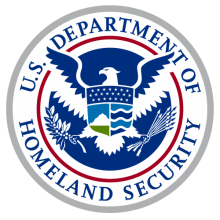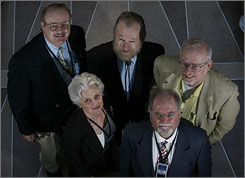Science Fiction for National Interests
 The USA Today newspaper writes about an interesting initiative of the American Department of Homeland Security ( DHS ; in our press this organization is often called the US Department of Homeland Security), which decided to shift the crucial task of forecasting, and therefore preventing possible future terrorist acts, onto the shoulders of people who According to him, most of the life spent in the future - on science fiction writers. For this, a working group of five well-known authors was created under the leadership of Arlan Andrews, Advisor on Science and Technology at the White House and co-author of many reports written for speeches by George W. Bush on this topic.
The USA Today newspaper writes about an interesting initiative of the American Department of Homeland Security ( DHS ; in our press this organization is often called the US Department of Homeland Security), which decided to shift the crucial task of forecasting, and therefore preventing possible future terrorist acts, onto the shoulders of people who According to him, most of the life spent in the future - on science fiction writers. For this, a working group of five well-known authors was created under the leadership of Arlan Andrews, Advisor on Science and Technology at the White House and co-author of many reports written for speeches by George W. Bush on this topic.As many recalled, the commission investigating the September 11 tragedy concluded that its main reason was the “lack of imagination” of the government and special services. Guest writers, who promise that soon there will not be a single, even the craziest, scenario of an attack by terrorists that they would not have thought out before, should fill this gap.
DHS is a powerful law enforcement and intelligence agency that, according to the famous Patriotic Act (PATRIOT Act), has virtually unlimited opportunities to deal with threats to America both domestically and abroad (in collaboration with the CIA, NSA, and other U.S. special forces). After the formation in March 2002, the Department absorbed the organizations that existed long before it, such as the Coast Guard and Secret Service, and also spawned many other units within itself, putting almost all aspects of state life under control. Therefore, the idea of attracting writers to work, which will largely determine the future strategy of DHS, seems to be even more original and non-standard.
However, this case is not the first, even in recent US history. In 1992, the same Andrews together with a retired colonel (and also writer and presidential adviser) Doug Beason (Doug Beason) gathered a group of science fiction writers and futurologists (in addition to them included Greg Bear, Gregory Benford, David Brin, Charles Sheffield, Stan Schmidt and Vernor Vinge) to advise various government services on strategic development and security planning.
Under the name Sigma Group, gradually changing its composition, but retaining the basis of Andrews and Beer, this group worked with the most serious institutions. For example, in the late 90s, participants held a series of safety conferences at Sandia National Labs, one of the two largest nuclear centers in the United States, where Andrews was a researcher at the time. Earned credibility allowed Bison to later become director of risk reduction at the Los Alamos Nuclear Center. Beer, who wrote a bestselling book about FBI agents, delivered lectures at the Academy Bureau to combat the future bio-terrorists.
However, even without this, all Sigma members would not have enjoyed the universal respect and reputation of visionary and competent specialists in many fields of knowledge. In an interview with USA Today on the occasion of hiring at DHS, Andrews said that a prerequisite for admission to the group was the presence of at least one doctorate, although most often the candidates had more. And no wonder, because to become a successful author of science fiction you need to be an extremely erudite person with a pronounced analytical mindset.
 In the early 80s, some members of the group were members of the Civil Space Consultative Council under the Reagan Administration, during which they prepared the famous report on SDI, who began the history of the “Star Wars” of the American government against the USSR (during this, to a greater extent, economic confrontation, as many Western historians believe, the last decisive battle took place in which the USSR lost the Cold War). Reagan’s big admirer, George W. Bush, is actively reviving the very idea in his missile defense system today, and this was probably partly why it was decided to re-offer cooperation to people who have worked so well in the past. The current lineup at Sigma includes Jerry Pournelle, Sage Walker, Larry Niven and the familiar Andrews and Bier (in the photo, the first three are in order from left to right in the upper row, the rest in the lower )
In the early 80s, some members of the group were members of the Civil Space Consultative Council under the Reagan Administration, during which they prepared the famous report on SDI, who began the history of the “Star Wars” of the American government against the USSR (during this, to a greater extent, economic confrontation, as many Western historians believe, the last decisive battle took place in which the USSR lost the Cold War). Reagan’s big admirer, George W. Bush, is actively reviving the very idea in his missile defense system today, and this was probably partly why it was decided to re-offer cooperation to people who have worked so well in the past. The current lineup at Sigma includes Jerry Pournelle, Sage Walker, Larry Niven and the familiar Andrews and Bier (in the photo, the first three are in order from left to right in the upper row, the rest in the lower )In general, almost all writers from Sigma can be considered examples of the American intelligentsia: immigrants from military families, graduates of prestigious universities and patriots to the bone. And although some of them are not enthusiastic about the belligerent actions of the current administration, they are still trying to do everything possible to, according to Niven, "save civilization." How much they will succeed, time will tell.
